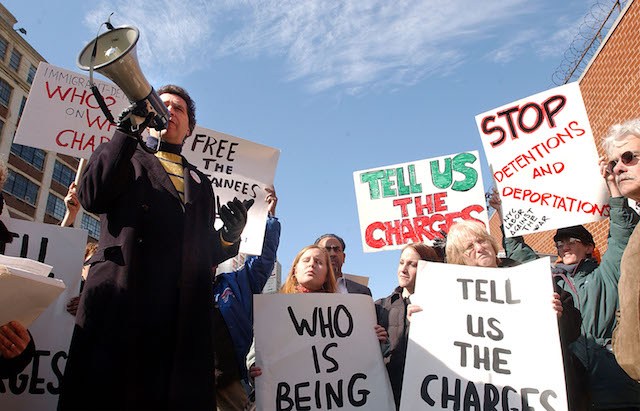Today (January 18), the United States Supreme Court heard oral arguments in Ziglar v. Abbasi, a major religious and ethnic profiling case. The central legal question in Ziglar is whether high-ranking officials in the Bush administration can be held responsible for profiling, rounding up and detaining Muslim, Arab and South Asian men in the wake of the September 11 attacks. But the Supreme Court’s decision could also have broad influence on the exercise and accountability of executive power in the incoming Trump administration.
Two weeks after the September 11 attacks, the FBI arrested Ahmer Iqbal Abbasi, a Pakistani cab driver in New York City. He was one of more than 700 men rounded up by federal authorities for investigations related to alleged connections to terrorist activity. Abbasi was deemed a “person of interest” by the FBI on the basis of a report that a “male possibly Arab” had used Abbasi’s address on a fraudulent Social Security card and passport. During an interrogation, Abbasi admitted to authorities that he had remained in the U.S. unlawfully after his asylum application had been denied, and that he wanted to be deported to Pakistan. Instead, for nearly a year, he was detained and placed in solitary confinement at the Metropolitan Detention Center (MDC) in Brooklyn, New York, where he and other detainees experienced harsh conditions.
According to the Center for Constitutional Rights (CCR), which is representing Abbasi and several former detainees in Ziglar v. Abbasi, the men were denied access to counsel, placed in brightly lit cells for 23 hours a day, subjected to sleep deprivation and strip searches, and not allowed to properly practice their faith. Many experienced physical and psychological abuse at the hands of guards. The men were held until cleared by the federal government, and then deported for minor immigration violations.
"I was targeted by the U.S. government because I was Muslim and a truck driver,” said plaintiff Anser Mehmood in a CCR report. “The FBI knew that I was innocent…after picking me up from my home, not a single person came to me to ask any questions during my whole stay at MDC and Passaic jail. From day one, they knew I was innocent. [They] picked me up from my home because I’m Muslim."
The defendants in the lawsuit include former Attorney General John Ashcroft, former FBI Director Robert Mueller and former Immigration and Naturalization Service Commissioner James Ziglar.
An independent government investigation [PDF] in 2003 criticized the “hold till cleared” policy of detaining individuals without charges as well as the abusive conditions under which detainees were held. Yet lawyers for the U.S. Department of Justice (DOJ) under both the Bush II and Obama administrations have argued that high-ranking officials cannot be held responsible for unconstitutional by non-citizens. The detainees, on the other hand, claim that Ashcroft, Mueller, Ziglar and former wardens and guards at the detention center implemented and oversaw unlawful policies that targeted, detained and abused them solely because of their nationality, immigration status and faith, all violations of fundamental constitutional rights.
In today’s political climate, Ziglar v. Abbasi could have far-reaching implications. Since the November election, President-Elect Trump, his advisors, and his cabinet nominees have set forth potential policies such as a Muslim registry and extreme vetting of nationals from “terror-prone countries”, all reminiscent of post 9/11 policies and practices. Advocates for the detainees in Ziglar v. Abbasi believe that the Supreme Court has the opportunity to define the parameters of relief for individuals aggrieved by such policies in the future. “Even though it is being heard in the last days of the Obama administration the case is really the first, most important test of the Supreme Court in the Trump era,” said Baher Azmy, legal director of the Center for Constitutional Rights. “Will the Supreme Court discharge its role to check religious and racial profiling or will it essentially give the Trump administration a de facto reign?”
